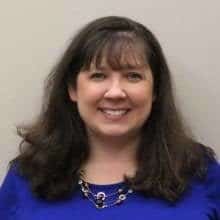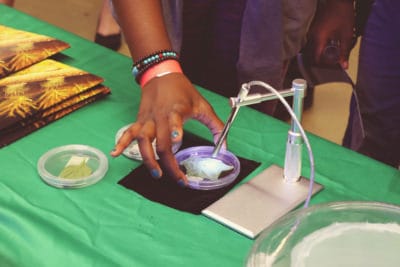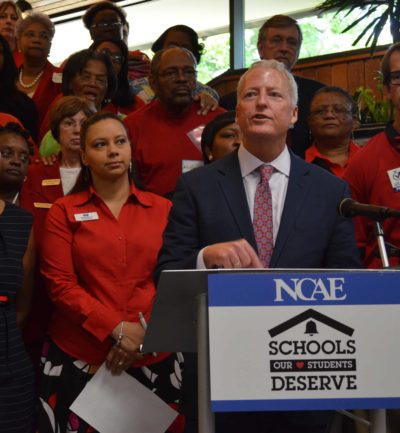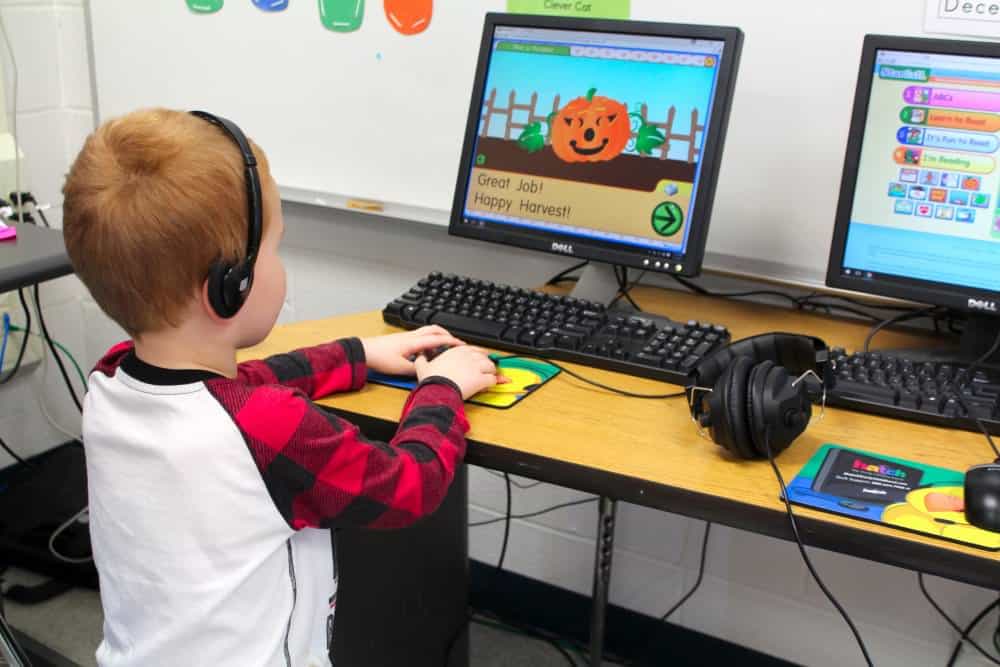

The Mebane Charitable Foundation has invested more than $17 million in literacy-related programs since 1998. The Foundation invested more than $7 million in literacy intervention partnerships with public school systems, traditional public schools, public charter schools, private schools, and other literacy-focused organizations in Davie County. While some interventions have worked better than others, all have provided valuable data, metrics, and research results.
A big bet, a national model
In April, the Mebane Charitable Foundation announced its largest partnership to date, a grant of almost $2.5 million to Davie County Schools to support DavieLEADS (Literacy Empowers All in Davie to Succeed), a five-year early literacy initiative to improve kindergarten readiness and to increase the percentage of students reading proficiently by the end of third grade.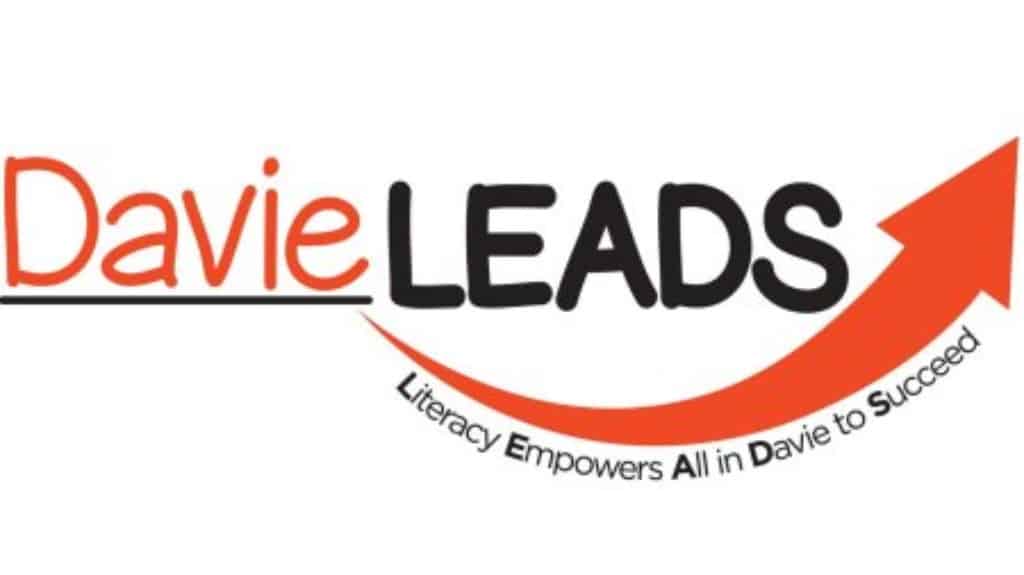

The goals of this initiative are to improve kindergarten readiness from 70 percent to 90 percent and to increase reading proficiency in third grade from 66 percent to 80 percent by 2022. This project will impact approximately 2,300 students each year over the 5-year implementation period.
Details of how those goals would be achieved were introduced to more than 400 Davie County pre-K and elementary school personnel during an end-of-year celebration in June 2017 at the West Campus of Calvary Baptist Church, complete with pom-poms, music, and a few spontaneous dance moves.
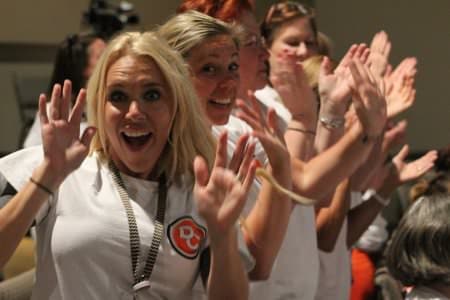

“When Dr. Hartness and his staff presented this proposal to my board it was a scary moment for everyone,” said Larry Colbourne, president of the Mebane Foundation. “What we hope to accomplish is a daunting task, but I told my board, that without a doubt, if there is a system in North Carolina that can do this, it will be Davie County Schools. You folks in the room can make it happen. I’m confident of that.”
Initially, the initiative will be a collaboration between Davie County Schools, Smart Start, and the public/private preschools. The grant from the Mebane Foundation will provide professional development, materials, and specialized support staff totaling $2,447,188.00 over five years, with additional supplementary funding for the Read to Achieve Summer Camp for at-risk first, second, and third graders who need extra academic support beyond the regular school year. In addition, this project will develop and build the professional capacity of 111 preschool through third-grade classroom teachers in Davie County Schools and 14 preschool teachers in private facilities. These educators will continue impacting countless students for years to come.
“I would like to make you a promise,” Colbourne added. “The Foundation does not want to get in your way. We are not going to make your jobs any more difficult than they already are.”
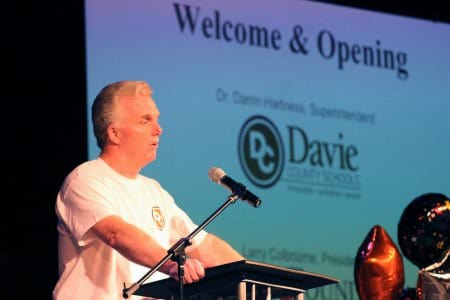

Dr. Darrin Hartness, the superintendent of Davie County Schools, added, “We wanted to bring you together to help you share in the excitement that we have in what is on the horizon and the things that are ahead for us. I have never been as thrilled about an opportunity as I am about this one. In my career in education, I’ve never seen a commitment from a private entity investing in what we do every day. This initiative with the Mebane Foundation is going to make you an envy of teachers across North Carolina. This is not some silver bullet, some shiny new thing in our school system. Instead, this is an investment in the most important factor in a child’s education because this is an investment in you. ”
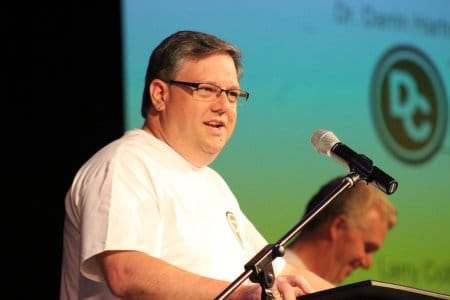

Process and partners matter
“This school year we began to hear from Dr. Hartness and Larry Colbourne the phrase ‘moving the needle,’”said Jinda Haynes, assistant superintendent for academic service. “They started asking, how can we move the needle, how can we improve, how can we do even better than we are already doing?”
“As we looked at our 2015-2016 data, the problem we identified is that 30 percent of our students aren’t ready for kindergarten and 34 percent of our students are not proficient at reading at the end of third grade. As well as we are doing, about a third of our students aren’t making it, and we can’t be okay with that one third not being prepared for the future,” Haynes said.
“This school year we began to hear from Dr. Hartness and Larry Colbourne the phrase ‘moving the needle,'” continues Haynes. “They started asking, how can we move the needle, how can we improve, how can we do even better than we are already doing?”
Those questions and concerns led to a series of roundtable discussions involving Colbourne, SmartStart, and Davie County Schools administrators, and pre-K–3rd-grade representatives from each elementary school with varied perspectives — all brainstorming how to improve early childhood literacy. Focus groups involving principals, instructional coaches, reading specialists, media coordinators, private child care directors, and SmartStart gathered input, prioritized, and built buy-in. Together they carefully crafted DavieLEADS, the long-term plan designed to move the needle in early childhood literacy in Davie County.
“Everyone in this room knows the importance of education,” Haynes said. “Education allows students to break the cycle of poverty and it opens the doors of opportunity for our children. We know that research tells us the importance of being able to read proficiently by the end of third grade, which is why it is a national focus, not just in North Carolina or Davie County.”
Realizing the value of being able to assess the effectiveness of this project and others they invest in, the Mebane Foundation developed a series of metrics that will help it prioritize its investments and maximize its impact.
Performance metrics: Q&A with Larry Colbourne
Q: The Mebane Foundation has made significant contributions to literacy initiatives for the past 16 years and has achieved great success. Although many project results have been anecdotal, why develop specific metrics now?
Through the years we know we’ve partnered in some great work and had good success helping children, but as an organization, we felt it was time “to move the needle.” The only way to do that is to measure growth, and without achievable and tangible metrics, how can we know whether we’re truly moving in the right direction? Well-defined metrics will also allow us to tweak our approach throughout the process. If we expect potential partners, like other school systems, foundations, and political leaders to someday replicate our work, we need to be sure we can prove how we achieved our success.
Q: What are the performance metrics the Foundation has adopted to assess its work? How did the Foundation arrive at the specific metrics being adopted?
In the fall of 2016, the Mebane Foundation board went through an extensive exercise that led us to a consensus on what metrics we should hold to for years to come. First, we wanted to continue to engage other partners, whether that meant peer foundations and corporate funders, or political and educational partners at the local, regional, and national level. Secondly, we wanted to look at our funding decisions more closely through a financial lens. In order to maximize our impact, our decision-making process will now be driven by the number of children served, the predicted growth, and the program costs. Finally, we decided we wanted to “popularize” what we do with our partners. We see this as a win-win: The partnering organizations get great exposure and we get the opportunity to share ongoing best practices with peers in our educational space.
Q: What do you anticipate the impact of these metrics will be for the Foundation?
For the Mebane Foundation, these metrics put us out there in front of our peers and enable us to share valuable information and ideas. We no longer want to operate in a silo. These metrics allow us to evaluate and validate what we’re doing.
Q: For the grantee organization?
We see the same benefits for our partners. Our metrics also will help them evaluate and validate their success.
Q: For students?
At the end of the day, it’s all about offering every student the best opportunity to succeed. Our metrics are not meant to be intrusive and create more work and tests for our students and teachers. Our main goal is to add support so that they can perform to the best of their abilities. Metrics are a necessity, but they shouldn’t make the task at hand more difficult. On the contrary, the metrics should serve as a guide for our students and teachers.
Q: Why did the Foundation provide such a generous grant to Davie County schools? What does it ultimately hope to achieve?
We have a strong history with Davie County that has been forged over many years through multiple partnerships. This project is a huge undertaking that will require a strong partnership built on trust. With everything we’ve been through together over the last 15 years, and with all the assets remaining intact, we couldn’t think of a better place to tackle these aggressive goals and metrics.
Q: How does the Foundation envision its future? What would it like to be doing in 5 years? 10 years?
Five to ten years from now, I hope to see us funding similar partnerships to the one with Davie County Schools. That would mean it was a success. We will know the number of children served, the growth achieved, and the cost. Armed with that knowledge, I would anticipate that other systems and partners will be willing to take a similar approach. It is our hope that the Mebane Foundation will continue to be a catalyst for excellence and innovation in early education for many years to come.
Editor’s Note: The Mebane Foundation supports EducationNC.
